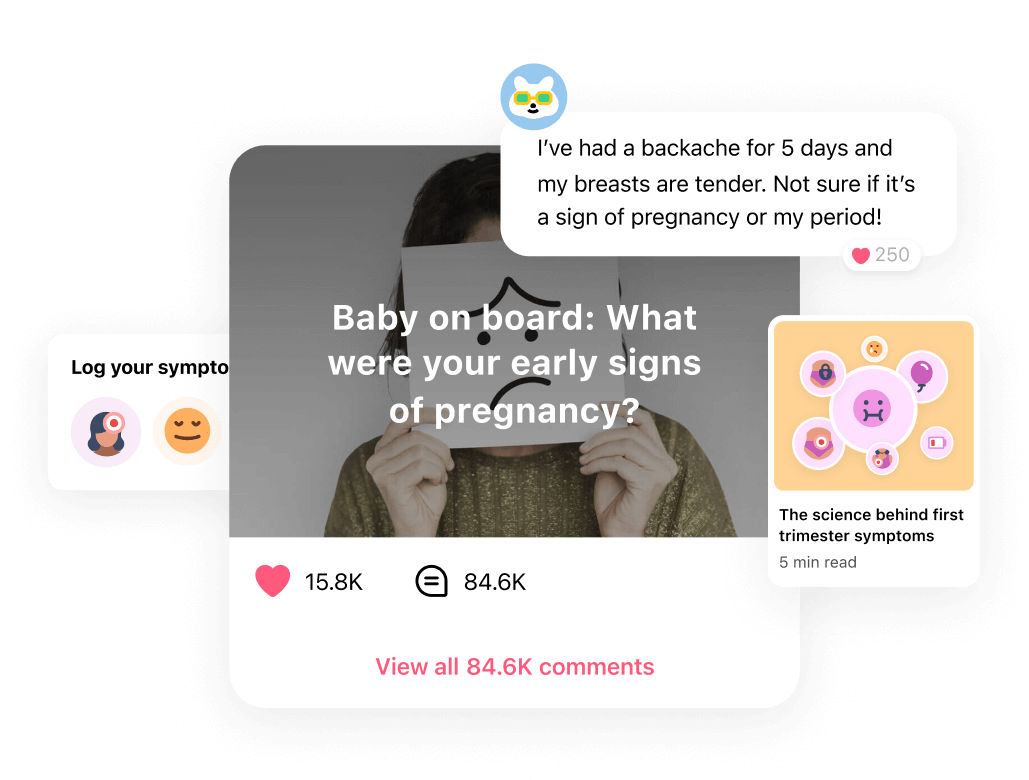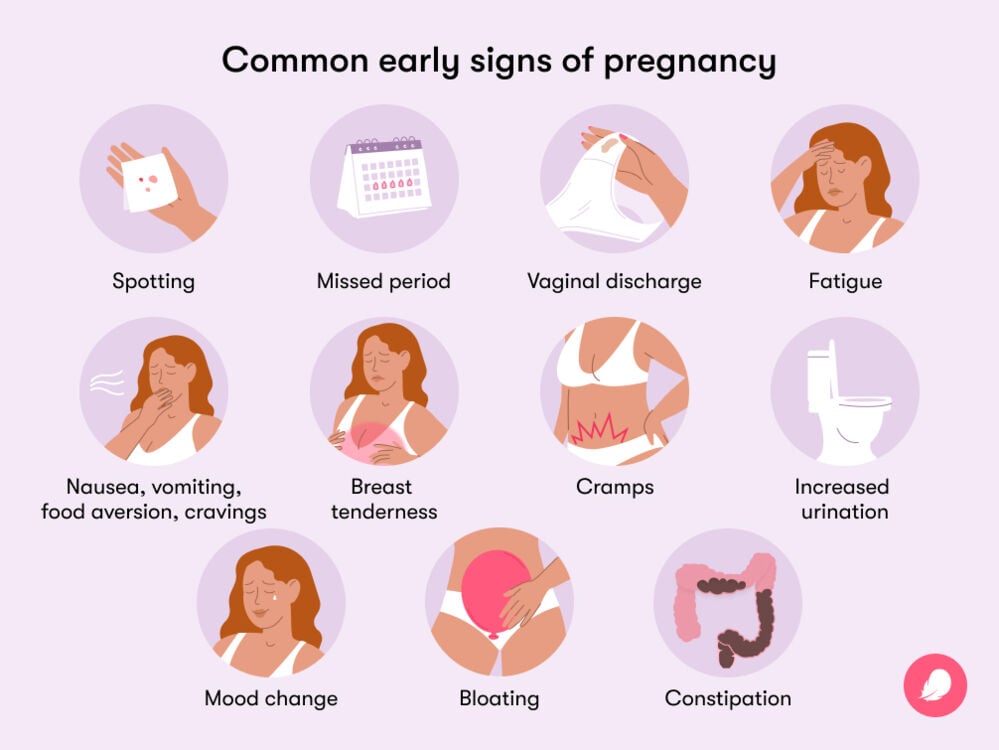Here’s how to spot if your cervical mucus changes are an early sign of pregnancy.
-
Tracking cycle
-
Getting pregnant
-
Pregnancy
-
Help Center
-
Flo for Partners
-
Anonymous Mode
-
Flo app reviews
-
Flo Premium New
-
Secret Chats New
-
Symptom Checker New
-
Your cycle
-
Health 360°
-
Getting pregnant
-
Pregnancy
-
Being a mom
-
LGBTQ+
-
Quizzes
-
Ovulation calculator
-
hCG calculator
-
Pregnancy test calculator
-
Menstrual cycle calculator
-
Period calculator
-
Implantation calculator
-
Pregnancy weeks to months calculator
-
Pregnancy due date calculator
-
IVF and FET due date calculator
-
Due date calculator by ultrasound
-
Medical Affairs
-
Science & Research
-
Pass It On Project New
-
Privacy Portal
-
Press Center
-
Flo Accuracy
-
Careers
-
Contact Us
Cervical mucus changes: Are they an early sign of pregnancy?


Every piece of content at Flo Health adheres to the highest editorial standards for language, style, and medical accuracy. To learn what we do to deliver the best health and lifestyle insights to you, check out our content review principles.
Have you noticed any changes to your cervical mucus? Are you wondering whether you’re pregnant before you've actually taken a pregnancy test? If so, then this article is for you. Here, we’ll take a closer look at what cervical mucus is and how it changes throughout your menstrual cycle, as well as during early pregnancy.
Key takeaways
- Cervical mucus is a fluid produced by the glands inside your cervix (the canal that leads to your uterus).
- Cervical mucus changes regularly during your menstrual cycle and also in early pregnancy.
- Noting your symptoms down with an ovulation tracking app like Flo can help you understand when you’re ovulating or in the early stages of pregnancy.
What is cervical mucus?
You’ve probably heard of cervical mucus, but what exactly is it? Well, cervical mucus is a fluid produced by the glands inside your cervix. It’s what makes up most of your vaginal discharge, along with skin cells and bacteria. If you’ve noticed your cervical mucus changing in color, volume, and texture throughout your menstrual cycle, then rest assured this is perfectly normal. It’s due to your hormones fluctuating.
Your cervical mucus might also change in early pregnancy, and we’ll have more details on that later. However, a quick note before we dive in: You shouldn’t rely solely on changes in cervical mucus to determine whether or not you’re pregnant. If your period is late, a pregnancy test is always the most accurate way to confirm if you’re pregnant.

 Over
7.8M
ratings averaging
4.8/5
*
Over
7.8M
ratings averaging
4.8/5
*
Understand your body’s signals with the Flo app
- Chat with others who are trying to get pregnant.
- Get trusted information on signs of pregnancy from 100+ medical experts.
- Log your symptoms and learn what they could be trying to tell you.
 Over
7.8M
ratings averaging
4.8/5
*
Over
7.8M
ratings averaging
4.8/5
*

Trying to conceive?
The Flo app can help you through the two-week wait.

 Over
7.8M
ratings averaging
4.8/5
*
Over
7.8M
ratings averaging
4.8/5
*
Understand your body’s signals with the Flo app
- Chat with others who are trying to get pregnant.
- Get trusted information on signs of pregnancy from 100+ medical experts.
- Log your symptoms and learn what they could be trying to tell you.
Different stages of cervical mucus during your cycle
Normally, your menstrual cycle follows a reasonably predictable pattern each month, meaning your cervical mucus often does the same.
After your period and before ovulation (when your ovary releases an egg), you may notice that your discharge is thick, white, and dry before gradually becoming creamier in texture.
As you get closer to ovulation — which occurs around 14 days before your period — your cervical mucus will become thin, clear, and slippery, a bit like raw egg whites. This type of discharge makes it easier for sperm to swim up and meet an egg to fertilize it. Clever, right? So, if you’re trying to get pregnant, this kind of mucus can mean it’s the best time to have sex.
Following this, if an egg isn’t fertilized, your discharge will return to being thick, white, and dry.
Keep in mind that you might not notice some of these changes if you’re taking hormonal birth control, as some forms of contraception can cause cervical mucus to become thicker (to make it harder for sperm to swim in it) or stop ovulation from happening.
It’s also worth noting that changes in vaginal discharge can sometimes be a sign of something out of the ordinary, such as an infection or a reaction to something like a tampon being inserted into your vagina. If you notice that your discharge has a strong or foul odor, yellow or green color, and you experience itching or redness, it’s a good idea to reach out to your health care provider for a checkup.
Checking cervical mucus for fertility
You can track the changes in your cervical mucus to help you figure out where you are in your cycle and when you’re most fertile (i.e., when you’re ovulating).
There are a few ways you can do this. First, you could insert a clean, dry finger into your vagina and then inspect your discharge by gently rubbing it between your index finger and thumb. Alternatively, you can check the discharge that shows up in your underwear throughout the day. As we’ve seen, if it’s thin, stretchy, and sticky like egg whites, then that’s a good sign you’re close to ovulation. If you’re trying to conceive, this is the time to have sex. However, if you’re not ready for pregnancy, you should use a condom or other barrier methods of birth control.
It’s a good idea to avoid checking your cervical mucus right after having unprotected sex or when you’re aroused, as you could mistake semen or arousal fluid for cervical mucus.
Take a quiz
Find out what you can do with our Health Assistant
Tracking cervical mucus
Want to get a more detailed overview of how your discharge changes throughout your menstrual cycle? It might be a good idea to try tracking your cervical mucus. To do this, you simply have to check your mucus every day (like we explained above) and keep track of the changes you see — such as the amount, texture, and color — on a cervical mucus chart. This is simply a chart that records your discharge each day. If you don’t feel like creating your own, you can use an app like Flo to track your cervical mucus and any other symptoms you experience throughout your cycle.
It’s worth noting that while tracking your cervical mucus is one of the many helpful ways to know when you’re fertile during your cycle, you shouldn’t solely rely on that for birth control.
What kind of cervical mucus indicates pregnancy?
Turns out there’s another reason to pay attention to your cervical mucus: It could be an indication that you’re pregnant or not. Just like it can tell you if you’re ovulating, a change in your discharge can be one of many early pregnancy symptoms.
As a recap, if you haven’t conceived, your discharge will return to being thick and dry after ovulation. However, if conception has occurred, you might notice an increase in discharge that is thin in consistency and a clear or milky white color. Just remember that every pregnancy is different, so if you don’t notice this, that doesn’t necessarily mean you’re not pregnant. Taking a pregnancy test around the day of a missed period is the best way to get an accurate answer.
Why does it change in early pregnancy?
During the early stages of pregnancy, your hormone levels will change, and this can affect your cervical mucus. A rise in estrogen will signal the cervix to produce more cervical mucus. This is an important process that helps to protect the fertilized egg from infections.
When will your cervical mucus change?
It can take a few weeks for hormones to build up after conception. This means that you may not notice any changes in your cervical mucus or experience other pregnancy signs until a few weeks after conception.
Most common early signs of pregnancy
If you’re wondering whether you’re pregnant, there are a number of telltale early symptoms and signs to look out for. The most common are:
- Vaginal discharge changes
- A missed period
- Experiencing nausea or vomiting or both at the same time
- Food aversions and cravings
- Swollen or tender breasts
- Spotting or light bleeding
- Cramps
- Mood changes
- Fatigue
- Needing to pee more
- Bloating
- Constipation
Just remember that every pregnancy is unique, so you could experience all of these signs, some of these signs, or even none at all.

Implantation bleeding
Sometimes — but not always — people experience implantation bleeding as an early sign of pregnancy (listed as spotting or light bleeding above). This is completely normal and happens when a fertilized egg attaches itself to the uterine lining. The bleeding can appear around the same time as your period would be expected to arrive, but it will be lighter than a normal period.
However, if you notice heavy bleeding or experience symptoms like severe cramping, a loss of fluid or tissue from your vagina, or the disappearance of any pregnancy symptoms, it’s best to call your health care provider immediately. They can provide the necessary care and support to manage your symptoms safely.
FAQs
What is cervical mucus like before a period?
Your cervix doesn’t produce much fluid before your period, so your cervical mucus will be dry and sticky around this time.
Can you feel dry in early pregnancy?
Every pregnancy is different, so you might not notice the increase in discharge that we mentioned above, which is completely normal. However, if your discharge is causing you any discomfort, it’s always better to be safe than sorry. Reach out to your health care provider so they can check you over and make sure everything is OK.
Is early pregnancy discharge similar to ovulation?
No. As we’ve seen, early pregnancy discharge is often thin, clear, and milky white, although this isn’t the case for everyone. In comparison, ovulation discharge is often slippery, like raw egg whites. If you don’t conceive, then your discharge will return to being thick and dry.


Hey, I'm Anique
I started using Flo app to track my period and ovulation because we wanted to have a baby.


The Flo app helped me learn about my body and spot ovulation signs during our conception journey.


I vividly
remember the day
that we switched
Flo into
Pregnancy Mode — it was
such a special
moment.
Real stories, real results
Learn how the Flo app became an amazing cheerleader for us on our conception journey.
References
Barad, David H. “Vaginal Discharge.” MSD Manual Consumer Version, Sep. 2022, www.msdmanuals.com/home/women-s-health-issues/symptoms-of-gynecologic-disorders/vaginal-discharge.
“Cervical Mucus.” Cleveland Clinic, my.clevelandclinic.org/health/body/21957-cervical-mucus. Accessed 21 Sep. 2023.
“Contraception: Hormonal Contraceptives.” InformedHealth.org, Institute for Quality and Efficiency in Health Care, 29 June 2017, www.ncbi.nlm.nih.gov/books/NBK441576/.
“Fertility Awareness-Based Methods of Family Planning.” The American College of Obstetricians and Gynecologists, Jan. 2019, www.acog.org/womens-health/faqs/fertility-awareness-based-methods-of-family-planning.
“Home Pregnancy Tests: Can You Trust the Results?” Mayo Clinic, 23 Dec. 2022, www.mayoclinic.org/healthy-lifestyle/getting-pregnant/in-depth/home-pregnancy-tests/art-20047940.
“Hormones during Pregnancy.” Johns Hopkins Medicine, www.hopkinsmedicine.org/health/conditions-and-diseases/staying-healthy-during-pregnancy/hormones-during-pregnancy. Accessed 22 Sep. 2023.
“Is Implantation Bleeding Common in Early Pregnancy?” Mayo Clinic, 19 Apr. 2022, www.mayoclinic.org/healthy-lifestyle/pregnancy-week-by-week/expert-answers/implantation-bleeding/faq-20058257.
Kumar, Pratap, and Navneet Magon. “Hormones in Pregnancy.” Nigerian Medical Journal, vol. 53, no. 4, Oct. 2012, pp. 179–83, pubmed.ncbi.nlm.nih.gov/23661874/.
Sobel, Jack D. “Patient Education: Vaginal Discharge in Adult Women (Beyond the Basics).” UpToDate, 13 Mar. 2023, www.uptodate.com/contents/vaginal-discharge-in-adult-women-beyond-the-basics.
“Symptoms of Pregnancy: What Happens First.” Mayo Clinic, 3 Dec. 2021, www.mayoclinic.org/healthy-lifestyle/getting-pregnant/in-depth/symptoms-of-pregnancy/art-20043853.
Witt, Barry.“Trying to Get Pregnant? Here’s When to Have Sex.” The American College of Obstetricians and Gynecologists, Aug. 2023, www.acog.org/womens-health/experts-and-stories/the-latest/trying-to-get-pregnant-heres-when-to-have-sex.
“Vaginal Discharge.” Mayo Clinic, 25 Apr. 2023, www.mayoclinic.org/symptoms/vaginal-discharge/basics/definition/sym-20050825.
“Vaginal Discharge in Pregnancy.” NHS, www.nhs.uk/pregnancy/related-conditions/common-symptoms/vaginal-discharge/. Accessed 22 Sep. 2023.
“Vaginal Bleeding.” NHS, www.nhs.uk/pregnancy/related-conditions/common-symptoms/vaginal-bleeding/. Accessed 22 Sep. 2023.
History of updates
Current version (13 November 2023)
Published (09 November 2018)
In this article

Get your personal guide to fertility
-
Learn how to read your body's ovulation signals
-
Find daily conception tips from our experts
-
Chat with others who are trying to get pregnant




